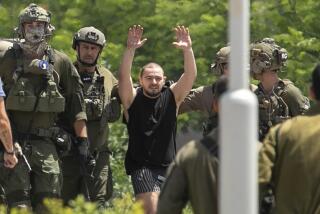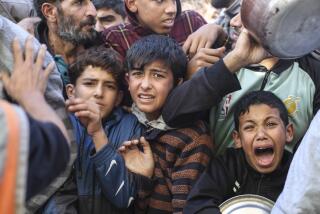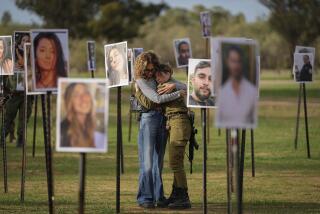Fighting Flares in Iraq’s North
BAGHDAD — Insurgents and Iraqi security forces battled in Mosul on Wednesday, leaving at least 22 people dead in a northern city often cited as a success story in restoring order to Iraq.
Local officials imposed a curfew in an effort to damp the deadliest violence in Mosul since sovereignty was returned to Iraq in late June. At least 14 of those killed were civilians; the others were believed to be insurgents.
Violence continued early today as a car bomb exploded at a police station south of Baghdad, killing at least five people and wounding 21, the Iraqi Health Ministry said.
The attack on the station in Mahawil, near the town of Hillah about 60 miles from Baghdad, was carried out by a suicide bomber in a Kia automobile, said Maj. Amjad of the station. He said the station was protected by some large barriers but a few had been moved aside to make room for pedestrians, and the bomber had exploited that breach.
Farther south, in the city of Najaf, heavy fighting was reported this morning between members of the Al Mahdi army of firebrand cleric Muqtada Sadr and Iraqi police backed by U.S. troops.
The continuing violence overshadowed Wednesday’s release of at least nine hostages who had been abducted in Iraq.
In Fallouja, a raid by Iraqi gunmen led to the release of four kidnapped Jordanian truck drivers. It appeared to be the first time such local action resulted in foreign hostages being freed. Meanwhile, two Turkish hostages were released by their kidnappers in response to a decision by Turkey’s trucking association to stop supplying U.S. forces in Iraq.
And the three sons of the governor of Al Anbar province, who were abducted last week, were released, a U.S. military spokesperson said. No other details were given.
With security still a pressing issue for the interim government, officials said Wednesday that they were looking forward to help from a proposed Muslim peacekeeping force, but that any troops sent to Iraq should be strong in number and willing to face risks. The possibility of such a force was raised last week at a meeting in Saudi Arabia between Secretary of State Colin L. Powell and Saudi officials.
“We are respecting very much the proposal of Saudi Arabia, and we are respecting the forces of Islam if they come and join the multinational forces and work with these forces with good cooperation, and work with us in partnership,” George Sada, the interim prime minister’s spokesman, said in an interview.
“These forces should not come from the countries surrounding Iraq,” Sada added, mentioning Pakistan, Bangladesh and Morocco as among those that might supply troops. “I believe that these Islamic countries are going to send forces,” he said.
The fighting in Mosul erupted Wednesday morning with an attack on a police station, followed over the next three hours by attacks with small-arms fire and rocket-propelled grenades on an Iraqi police patrol, a power plant and a hospital, the U.S.-led multinational force said in a statement. In addition to the deaths, 31 people were wounded, it said. No Iraqi police were reported killed. Two insurgents were captured.
At the peak of the fighting, dozens of masked militants were seen in the city carrying assault rifles and grenade launchers.
Duraid Kashmoula, governor of the province that includes Mosul, imposed a 3 p.m.-to-6 a.m. curfew on the city.
“I am asking from you, my beloved people of Mosul, to stay calm and do not be afraid, because we will do our best to stop anyone who might bother you,” he said.
“What has happened today, destruction by burglars and criminals, this proves that they are not real Iraqis,” Kashmoula said. “The Iraqi police, the national guard and the Facilities Protective Service personnel faced them and killed or arrested many of them.”
At least one person was killed last week in Mosul in a series of coordinated attacks against Christian targets in Iraq. Just before the hand-over of sovereignty in June, a car bombing in the city killed more than 60 people and injured 220.
Despite those incidents, Mosul, about 225 miles north of Baghdad, the capital, has been considered calm compared with the so-called Sunni Triangle.
No U.S. forces were reported involved in Wednesday’s fighting in Mosul, but a roadside bomb exploded in the city center as an American convoy passed by. No one was killed in that incident, but three U.S. troops and a British soldier died in other incidents, and 16 coalition troops were wounded, the military said. A Marine died after being shot in the chest in Al Anbar province, in western Iraq.
That brings the unofficial tally of U.S. military deaths since the invasion in March 2003 to more than 915.
The British soldier died when a retaining wall at a British base in southern Iraq fell onto his open vehicle, the military said. The British toll now stands at more than 60 military personnel.
Word of the release of the four Jordanians first came from a tribal chief in Fallouja who said he had led a nighttime raid that freed the men without bloodshed. One of the former hostages, Ahmad Hassan abu Jafaar, later spoke with reporters and said the freed men were safe.
“When the brave people of Fallouja knew that we were held hostage, they raided the house and rescued us last night,” Jafaar told Reuters news agency.
A group calling itself the Death Squad of Iraqi Resistance had said it was holding the Jordanians to pressure their transport company to stop working for U.S. forces.
Turkey’s Anatolian news agency quoted Foreign Minister Abdullah Gul as confirming the release of the two Turkish hostages. Turkey’s top trucking association announced Monday that it was halting all deliveries to U.S. forces in Iraq after militants released footage of a Turkish hostage being shot dead.
“Due to the Turkish firm’s decision to stop sending supplies to U.S. forces in Iraq, the Tawhid and Jihad Group has decided to free the two Turkish hostages,” said a videotaped statement from the group that was broadcast on Qatar-based satellite TV channel Al Jazeera. The group is believed to be associated with Jordanian-born Abu Musab Zarqawi, who U.S. officials say is a leader of the Iraq insurgency.
About 70 people, mainly truck drivers, have been taken hostage. At least seven have been executed.
Interim Iraqi President Ghazi Ajil Yawer, in comments to reporters Wednesday, also endorsed a Muslim force. He said that any countries sending troops should contribute fairly large forces and not pull out if they sustain casualties.
“They should not be symbolic in number, as if they are in a carnival -- 40 and 50 -- and whenever they have any trouble they return home,” Yawer said, an apparent reference to the Philippines’ early withdrawal of its small contingent to save the life of a kidnapping victim.
At the United Nations, Secretary-General Kofi Annan said the world body hadn’t received any offers of Muslim troops.
Sada, the Iraqi spokesman, also said that an amnesty law aimed at encouraging supporters of insurgents to switch to the government side had been signed by interim Prime Minister Iyad Allawi. Full details will not be released until Saturday, but the law does not provide amnesty for any insurgents who have killed anyone, he said.
Times staff writers Mark Mazzetti in Baghdad and Maggie Farley at the United Nations and special correspondents Roaa Ahmed in Mosul and Salar Jaff in Baghdad contributed to this report.
More to Read
Sign up for Essential California
The most important California stories and recommendations in your inbox every morning.
You may occasionally receive promotional content from the Los Angeles Times.










